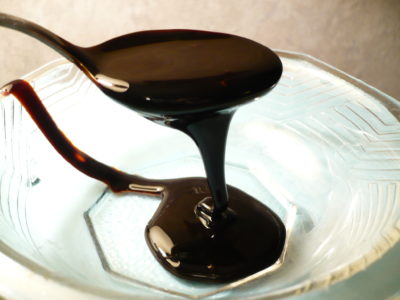Molasses is a brown, viscous byproduct of sugar making, typically produced from sugarcane or sugar beets (although grapes, sorghum, dates, pomegranate, carob, and a number of other foods can also produce molasses-like products). After sugarcane is harvested and its juice is extracted (typically by cutting, crushing, or mashing), the juice undergoes multiple boilings to concentrate it and allow sugar crystals to form. The dark, thick syrup remaining after the sugar crystals are removed is what we call molasses. Blackstrap molasses is the residue remaining after the third and final boiling, and as a result, it’s thicker, darker, and more nutritious than any other molasses! It also has a much stronger flavor and lower sugar content, since three rounds of sugar crystals have been removed (most of the remaining sugar is caramelized, contributing to the dark brown color of the syrup). Basically, as refined sugar is extracted, all of the nutrients originally present are concentrated in this final product, blackstrap molasses! You can usually find this type of molasses in specialty grocery stores and health food stores. Historically, blackstrap molasses has been used not only as a cooking ingredient, but also medicinally. It was traditionally given as a remedy for an upset stomach, used directly in the ear to treat earaches (although I don’t recommend you try that!), and papers dating back to the 1930s and earlier discuss it as therapy for iron-deficiency anemia due to its high iron content and ability to raise serum ferritin.
Blackstrap molasses is more than just a good source of sugar; it is totally chock-full of nutrition (especially compared to processed sweeteners!). This form of molasses contains more than 20% of the RDV for iron, copper, and manganese; more than 5% of vitamin B6, selenium, magnesium, and potassium; and trace amounts of sodium, zinc, and phosphorus.
Picking the right source of molasses is just as important, because it determines how much of this nutrition ends up in the bottle! You want to go for unsulfured blackstrap, because that means it was processed without the bleaching agent sulfur dioxide. My favorite type of blackstrap molasses is available on Amazon, but you can also check your local grocery store.
If you’re interested in learning more about blackstrap molasses, I recently wrote this blog post detailing why we need to add more of it into our diets!


 Bay Leaves
Bay Leaves